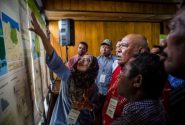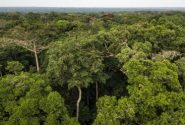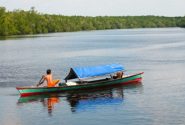
Tomorrow’s US election will make a difference to future climate change agreements. Vox Efx
BOGOR, Indonesia (5 November, 2012)_Negotiators preparing to fly to Doha later this month for the next round of U.N. climate change talks will have a close eye on the outcome of the U.S. elections tomorrow, said Tony La Viña, a lead negotiator for the Philippines.
“Everyone knows that this election will make a lot of difference to the future of international climate change agreements,” said La Viña, negotiator for the Philippines and REDD+ facilitator at the United Nation Framework Convention on Climate Change Conference of Parties 18 (UNFCCC COP18).
Both the Democrat and the Republican parties have come under recent criticism for the scant mention of climate change in the presidential campaign. And without the backing of the future U.S. administration, major players from both developing and developed countries could choose to opt out of negotiations at Doha, said La Viña.
“An overarching or comprehensive agreement without the U.S. just does not make sense…It will be very hard for some countries to move forward, as we have already seen with the Kyoto Protocol.”
The Kyoto Protocol (KP) is a legally binding agreement under which 191 industrialised countries have agreed to reduce their collective emissions of four greenhouse gases by 5.2 percent compared to the year 1990.
While Doha will be the last chance for countries to sign up to KP’s second commitment phase (2013-2017), many are sceptical of its effectiveness, since Canada, Russia and Japan have not signed up to new targets. The U.S. is the world’s second largest greenhouse gas emitter, yet has never ratified the Kyoto Protocol.
An overarching or comprehensive agreement without the U.S. just does not make sense…It will be very hard for some countries to move forward, as we have already seen with the Kyoto Protocol.
Enter The Durban Platform — a new climate agreement brokered by U.S. policymakers under a Democratic administration. Unlike the Kyoto Protocol that requires only developed nations to cut emissions, the Durban Platform, expected to take effect in 2020, will bind major developing economies such as India, China and Brazil to also cut their emissions.
“Fundamentally, we got the kind of symmetry we have been focused on since the beginning of the Obama administration,” said Todd Stern, U.S. Special Envoy for Climate Change after the early-morning decision in Durban.
While many countries have already agreed to set emissions reductions targets under the Durban Platform, the size of these reductions will not be decided until 2015.
However some environmentalists and climate experts believe that despite the uncertainty over a future climate agreement, many countries are still pushing ahead with climate mitigation programmes, such as Reducing Emissions from Deforestation and Degradation schemes (REDD+) and the Kyoto Protocol.
“Deforestation is becoming a smaller percentage of total emissions, in part because fossil fuel emissions continue to climb, but also because some countries are successfully tackling deforestation independently of the UNFCCC. Much is already being achieved in the absence of an international climate agreement,” said Louis Verchot, leading climate change expert for the Center for International Forestry Research (CIFOR).
In a joint statement submitted in May 2012 to the working group tasked with drafting the new agreement, Colombia, Costa Rica, the Dominican Republic and Peru stressed that the platform must build on exisiting climate mitigation actions.
“We have come a long way towards creating the institutional architecture of the international climate regime. This new protocol must include, adapt and improve ongoing institutional and organisational work on adaptation, finance, technology, REDD+, market mechanisms, mitigation and MRV.”
La Viña, who is also a member of CIFOR’s Board of Trustees, is confident that, despite the difficulties that have tainted past agreements, the new treaty could provide a blank canvas on which countries can express their interests.
“Kyoto is a done deal and with a structure of its own, but a new legally binding agreement starts from a draft on which all countries have a say on what a legally binding commitment would look like”.
We want you to share Forests News content, which is licensed under Creative Commons Attribution-NonCommercial-ShareAlike 4.0 International (CC BY-NC-SA 4.0). This means you are free to redistribute our material for non-commercial purposes. All we ask is that you give Forests News appropriate credit and link to the original Forests News content, indicate if changes were made, and distribute your contributions under the same Creative Commons license. You must notify Forests News if you repost, reprint or reuse our materials by contacting forestsnews@cifor-icraf.org.












